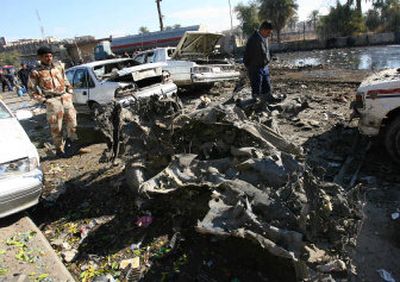Bush making changes ahead of Iraq speech

WASHINGTON – President Bush is overhauling his top diplomatic and military team in Iraq, as the White House scrambles to complete its new war policy package in time for the president to unveil it in a speech to the nation next week, officials said.
But the White House is struggling to overcome deep differences among advisers over both the deployment of additional U.S. troops and whether the government of Iraqi Prime Minister Nouri al-Maliki can deliver long-delayed political and military actions, according to officials familiar with the debate.
With significant policy details left to be worked out this weekend, the administration is nonetheless moving ahead on several personnel changes. It is set to announce that Army Lt. Gen. David Petraeus, who gained fame for his early success in training Iraqi troops and securing a volatile city in northern Iraq, will replace Gen. George Casey as commander of the multinational forces in Iraq, officials say.
The administration also intends to nominate Admiral William Fallon to head Central Command, replacing Gen. John Abizaid. Some military officials consider Fallon an unusual choice, because he is a naval officer in charge of Pacific Command with limited experience in the Middle East and would be in charge of two ground wars in Iraq and Afghanistan.
On the diplomatic side, the White House will appoint veteran U.S. diplomat Ryan Crocker, the current envoy to Pakistan who began his career in the 1970s in Iraq, as the new ambassador to Baghdad. The controversial current ambassador to Iraq, Zalmay Khalilzad, will be nominated to become the top U.S. envoy at the United Nations, replacing John Bolton, U.S. officials say.
The president is tentatively set to speak Wednesday about his new plan for Iraq, with al-Maliki due to unveil his own new security plan a day or two before the Bush speech. Bush spoke for almost two hours with al-Maliki on Thursday by videoconference, half of which was just the two of them, plus translators.
Al-Maliki pledged to Bush that he will announce the deployment of three additional Iraqi army brigades to help secure Baghdad, U.S. officials said. The Iraq commitment would be in the neighborhood of some 4,500 troops, according to their brigade strengths.
On deploying new U.S. troops in Iraq, Bush pledged to make sure that the mission is “clear and specific and can be accomplished.”
But deep divisions remain between the White House on one side and the Joint Chiefs and congressional leaders on the other about whether a surge of up to 20,000 troops will turn around the deteriorating situation, according to U.S. officials.
The U.S. military is increasingly resigned to the probability that Bush will opt to deploy a relatively small number of additional troops – between one and five brigades – in part because he has few other dramatic options available to signal U.S. determination in Iraq, U.S. officials said. But the Joint Chiefs have also not given up making the case that the potential dangers outweigh the benefits for several reasons, officials said.
There are already signs that a limited U.S. escalation, even when complemented by new political and economic steps, may not satisfy either supporters or critics of a surge. Both Pentagon officials and military experts say far more troops are needed to make a real difference, but the United States will have to remobilize reserves, extend current tours of duty and accelerate planned deployments just to come up with 20,000 troops, U.S. officials say. And such a surge would strap the military for other potential crises, they add.
After more than a month of interagency discussions chaired by deputy national security adviser J.D. Crouch II, deep differences also remain among administration officials over the fundamental question of whether Iraq’s Shiites can pull together a moderate political center.
Washington needs Baghdad to provide its own military manpower to confront the illegal Shiite militias who are fueling sectarian violence and to take political steps to accommodate Sunni grievances, notably in promised but long-delayed amendments to the new constitution.
But the crude execution of Saddam Hussein and the Iraqi government’s insistence that two top officials of the Iranian Revolutionary Guards, who were captured in a U.S. military raid, had to be handed back to Tehran have fueled U.S. concern that the government is under the partial control of Shiite militias and Iran. Though the White House has officially endorsed al-Maliki, U.S. officials are divided about whether the prime minister will really deliver, particularly badly needed Iraqi troops.
Bush also spoke out for the first time Thursday about Saddam’s execution, noting that he wished the proceedings had unfolded in a “more dignified way.”
But he said that Saddam was given justice. “My personal reaction is that Saddam Hussein was given a trial that he was unwilling to give the thousands of people he killed,” Bush said. “He was given a fair trial, something he was unwilling to give thousands of Iraqi citizens who he brutalized.”